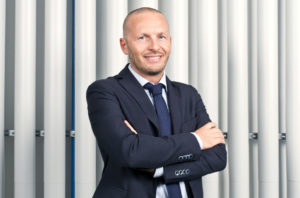Those who have chosen EPDItaly tell their story: VALSIR

Andrea Sbicego – Energy manager
What are the main reasons that pushed you towards the voluntary EPD certification?
Valsir spa has always been faithful to the principles of sustainability in the implementation of industrial processes and in the development of its products. There are many voluntary certifications that we have obtained over the years. The company, which is ISO 9001 and ISO 14001 certified, was among the first 300 in Italy to obtain the ISO 50001 certification of its Energy Management System.
Each year it invests an important share of its turnover in the continuous improvement of the energy efficiency of its processes and in increasing the share of energy from renewable sources. In 2021 alone, we installed 1.6 MWp of photovoltaics, increasing the installed power by 45%. Since 2020, a trigeneration plant has also been active which satisfies 50% of the electricity needs and 100% of the thermal and refrigeration requirements of the Vobarno site, where we produce our Pexal multilayer pipe.
This sustainability policy inevitably translates into a lower environmental impact of our products, and the achievement of the EPD certification obtained motivates us to proceed with even more determination along the road to decarbonisation.
Which product of your company has obtained the EPD? What are its main features?
We have obtained the EPD certification for the main technological solutions of our production: the PP3, Triplus and Blackfire high-performance soundproofing drainage systems, the water supply systems – composed of the Pexal multilayer piping and the three ranges of fittings PexalEasy, Bravopress and PexalBrass – and the TropeaS flush cisterns, characterized by low water consumption and high silence. But we don’t stop there: we plan to extend the EPD certification to many other ranges, demonstrating how fundamental the sustainability of products and production processes is today.
What are the main advantages obtained from the publication of the Environmental Product Declaration? What are the repercussions on the final consumer?
The main advantage is that of having acquired a greater awareness of the phases of the life cycle that have the greatest impact on our products from an environmental point of view. All this allows us to be able to make targeted strategic choices aimed at reducing or mitigating their impact.
To date, there are still many obstacles to overcome, especially of a cultural and regulatory nature, to make this tool truly useful, effective and functional. But we are convinced that the time will soon be ripe, and we will be ready to make our products even more “circular” and sustainable.
Do you think that EPDItaly can contribute to spreading the culture of product sustainability?
Certainly. The issue of product sustainability is increasingly topical, but there is still a great deal of room for growth. Every cultural transformation is a very complex phenomenon: but once triggered, the virtuous circle is irreversible. Continuously supporting decarbonisation policies, including through the conscious use of sustainable products with a low environmental impact, is part of that process of change in which we are all required to participate.
How important, in your opinion, is the presence of sustainable Italian products within a Program Operator that makes the international network one of its strengths?
I believe that it is essential to reaffirm the quality of “Made in Italy” products on an international scale, being able to proudly add that they are made “in a sustainable way”.

